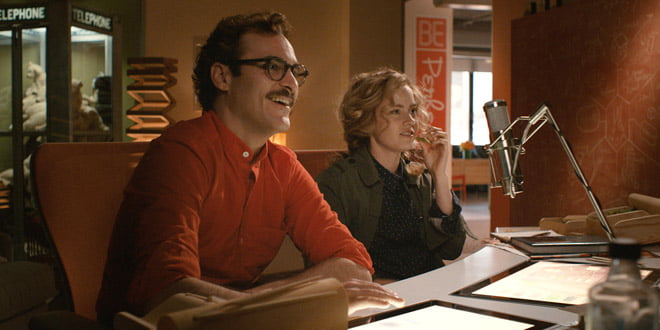The first law of Isaac Asimov’s Three Laws of Robotics states, “A robot may not injure a human being or, through inaction, allow a human being to come to harm.” These laws have been the basis for countless troves of science fiction, with the idea being that artificial life would need some sort of guidelines to protect it and us. Rarely, though, has the first law been applied to the question of emotional harm. In writer and director Spike Jonze’s new drama Her, this question bombards us alongside many others.
The “robot” in Her is an artificial intelligence (AI) based operating system named Samantha, voiced by Scarlet Johansson, who never actually appears on screen. Theodore (Joaquin Phoenix) plays the man who falls in love with Samantha, and you probably think you can already guess where this is headed, but you’d be wrong. Samantha is not evil nor the butt of jokes. Every time Jonze’s script seems headed to zig, he zags instead. Rather, this is a tender love story that addresses issues of the hurt and loss every relationship produces (in varying doses) better than perhaps any film since Eternal Sunshine of the Spotless Mind.
The bombarding of question does indeed address can an AI cause emotional harm, but it branches out into questions on the nature of relationships, online dating, phone sex, prostitution, and more. This is the heady science fiction of the aforementioned Eternal Sunshine, 2001, Blade Runner, and Contact. The biggest question it asks, however, may be how our technology-driven world reshapes us. Theodore doesn’t simply fall in love with Samantha; he bonds with a video game character and generally withdraws from human interaction. How far fetched is any of this in today’s society?
Jonze does eventually cast a vote on the question, but not before letting it linger with us throughout the movie’s front and center romance. As Theodore dances through crowds in the jubilation of love, he’s not simply ignoring them, as they too are ignoring him. No one seems to notice there’s a man in their midst carrying on deeply intimate conversations because they are too wrapped up in their own personal pod of electronic communication. Has there even been a stronger argument for the “be here now” mantra than this film?
Alas, the compelling arguments don’t exactly add up to a compelling film. At 126 minutes in length, the last 20 or so minutes really drag. Amy Adams reliably turns in another solid performance here, but we get so little of her that we’re exuberant when she shows back up. I think that was intentional, but the feeling generally undercuts Johansson’s performance. We should be more in love with her character by the end, but we’re not. The third act lacks some of the emotional gut punch that it’s set up for.
There is much to like in this stripped down romance—perhaps too much. Asimov once said, “The true delight is in the finding out rather than in the knowing.” There’s a lot of finding out here that will delight many, but left me slightly unknowing of how I felt about any of it.

